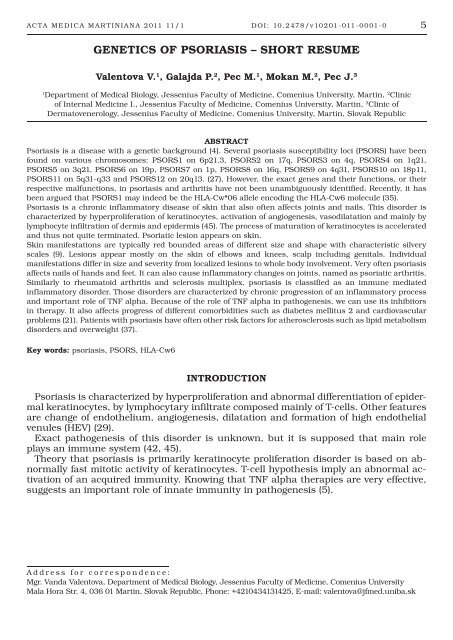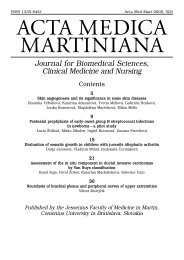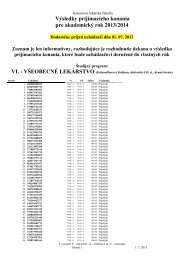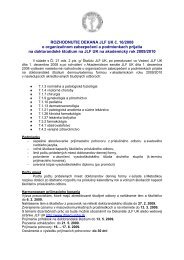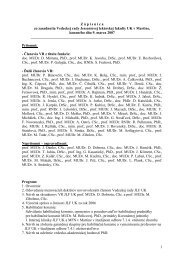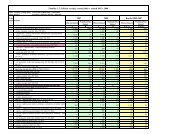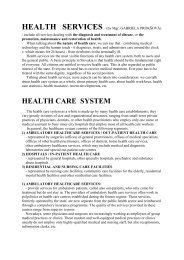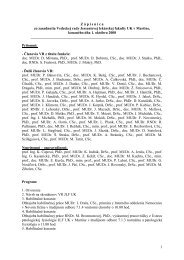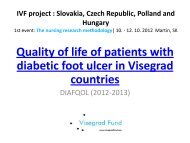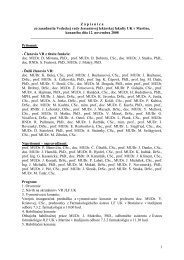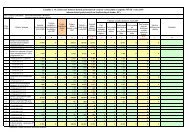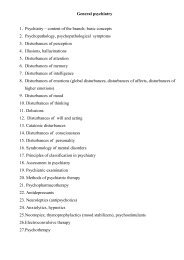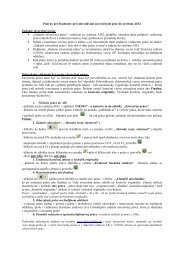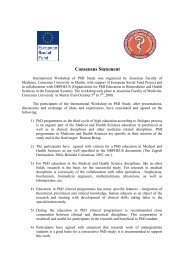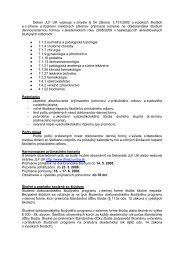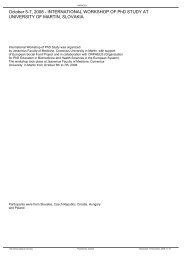Acta Medica Martiniana - Univerzita Komenského
Acta Medica Martiniana - Univerzita Komenského
Acta Medica Martiniana - Univerzita Komenského
You also want an ePaper? Increase the reach of your titles
YUMPU automatically turns print PDFs into web optimized ePapers that Google loves.
ACTA MEDICA MARTINIANA 2011 11/1<br />
DOI: 10.2478/v10201-011-0001-0<br />
5<br />
GEnEtICS OF PSORIASIS – SHORt RESUME<br />
Valentova V. 1 , Galajda P. 2 , Pec M. 1 , Mokan M. 2 , Pec J. 3<br />
1<br />
Department of <strong>Medica</strong>l Biology, Jessenius Faculty of Medicine, Comenius University, Martin, 2 Clinic<br />
of Internal Medicine I., Jessenius Faculty of Medicine, Comenius University, Martin, 3 Clinic of<br />
Dermatovenerology, Jessenius Faculty of Medicine, Comenius University, Martin, Slovak Republic<br />
ABStRACt<br />
Psoriasis is a disease with a genetic background (4). Several psoriasis susceptibility loci (PSORS) have been<br />
found on various chromosomes: PSORS1 on 6p21.3, PSORS2 on 17q, PSORS3 on 4q, PSORS4 on 1q21,<br />
PSORS5 on 3q21, PSORS6 on 19p, PSORS7 on 1p, PSORS8 on 16q, PSORS9 on 4q31, PSORS10 on 18p11,<br />
PSORS11 on 5q31-q33 and PSORS12 on 20q13. (27). However, the exact genes and their functions, or their<br />
respective malfunctions, in psoriasis and arthritis have not been unambiguously identified. Recently, it has<br />
been argued that PSORS1 may indeed be the HLA-Cw*06 allele encoding the HLA-Cw6 molecule (35).<br />
Psoriasis is a chronic inflammatory disease of skin that also often affects joints and nails. This disorder is<br />
characterized by hyperproliferation of keratinocytes, activation of angiogenesis, vasodilatation and mainly by<br />
lymphocyte infiltration of dermis and epidermis (45). The process of maturation of keratinocytes is accelerated<br />
and thus not quite terminated. Psoriatic lesion appears on skin.<br />
Skin manifestations are typically red bounded areas of different size and shape with characteristic silvery<br />
scales (9). Lesions appear mostly on the skin of elbows and knees, scalp including genitals. Individual<br />
manifestations differ in size and severity from localized lesions to whole body involvement. Very often psoriasis<br />
affects nails of hands and feet. It can also cause inflammatory changes on joints, named as psoriatic arthritis.<br />
Similarly to rheumatoid arthritis and sclerosis multiplex, psoriasis is classified as an immune mediated<br />
inflammatory disorder. Those disorders are characterized by chronic progression of an inflammatory process<br />
and important role of TNF alpha. Because of the role of TNF alpha in pathogenesis, we can use its inhibitors<br />
in therapy. It also affects progress of different comorbidities such as diabetes mellitus 2 and cardiovascular<br />
problems (21). Patients with psoriasis have often other risk factors for atherosclerosis such as lipid metabolism<br />
disorders and overweight (37).<br />
Key words: psoriasis, PSORS, HLA-Cw6<br />
IntRODUCtIOn<br />
Psoriasis is characterized by hyperproliferation and abnormal differentiation of epidermal<br />
keratinocytes, by lymphocytary infiltrate composed mainly of T-cells. Other features<br />
are change of endothelium, angiogenesis, dilatation and formation of high endothelial<br />
venules (HEV) (29).<br />
Exact pathogenesis of this disorder is unknown, but it is supposed that main role<br />
plays an immune system (42, 45).<br />
Theory that psoriasis is primarily keratinocyte proliferation disorder is based on abnormally<br />
fast mitotic activity of keratinocytes. T-cell hypothesis imply an abnormal activation<br />
of an acquired immunity. Knowing that TNF alpha therapies are very effective,<br />
suggests an important role of innate immunity in pathogenesis (5).<br />
Address for correspondence:<br />
Mgr. Vanda Valentova, Department of <strong>Medica</strong>l Biology, Jessenius Faculty of Medicine, Comenius University<br />
Mala Hora Str. 4, 036 01 Martin, Slovak Republic, Phone: +4210434131425, E-mail: valentova@jfmed.uniba.sk


